All that glitters not gold .. who’s who in the Hollywood Foreign Press?
Jan 18th, 2007 | By Randall White | Category: Entertainment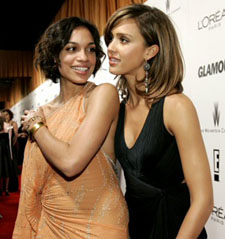 The Academy Awards used to be all that counted. But these days the Golden Globes, whose 64th edition hit the US TV airwaves on Monday, January 15, “generally ranks as the third most-watched awards show each year, behind the Oscars and the Grammys.” This year there has been an undercurrent of criticism about the Globes, inside and outside the USA. I dropped into the three-hour extravaganza off and on. And it did seem bizarre that it all hinged on the judgments of only “about 90 members” of the Hollywood Foreign Press Association (none of whose names I knew). So I looked quickly at the past and present of the “HFPA.” This at least put the latest sobering news from the Bulletin of Atomic Scientists in a more entertaining light. And in the very end “Hooray for Hollywood” still seems more or less right.
The Academy Awards used to be all that counted. But these days the Golden Globes, whose 64th edition hit the US TV airwaves on Monday, January 15, “generally ranks as the third most-watched awards show each year, behind the Oscars and the Grammys.” This year there has been an undercurrent of criticism about the Globes, inside and outside the USA. I dropped into the three-hour extravaganza off and on. And it did seem bizarre that it all hinged on the judgments of only “about 90 members” of the Hollywood Foreign Press Association (none of whose names I knew). So I looked quickly at the past and present of the “HFPA.” This at least put the latest sobering news from the Bulletin of Atomic Scientists in a more entertaining light. And in the very end “Hooray for Hollywood” still seems more or less right.
The Past …
 In January 2007 – handing out awards for (more or less) Hollywood-based American movies and TV that appeared in 2006 – “Brits” were “the toast of the Golden Globes” (e.g. “Helen Mirren and Sacha Baron Cohen walk away with two of the big awards”). And this is apparently not so rare generally. As also reported in the New Zealand Herald: “as usual, a clutch of Brits stole the show.”
In January 2007 – handing out awards for (more or less) Hollywood-based American movies and TV that appeared in 2006 – “Brits” were “the toast of the Golden Globes” (e.g. “Helen Mirren and Sacha Baron Cohen walk away with two of the big awards”). And this is apparently not so rare generally. As also reported in the New Zealand Herald: “as usual, a clutch of Brits stole the show.”
(The current great British actors, now playing Greece to the Rome of the USA, are careful not to push their luck. Helen Mirren in her victory speech gracefully alluded to some prior remarks by The Devil [who] Wears Prada [whatever that is], Meryl Streep, whose victory speech had shown why she remains the reigning queen of American actresses. At the same time, Brits can also push the envelope, in ways that sometimes elude North Americans – in all of the USA, Mexico, and Canada. Amidst assorted near-outrageous scatological remarks in his victory speech Sacha Baron Cohen also thanked all those Americans who have so far not sued him for Borat: Cultural Learnings Of America For Make Benefit Glorious Nation Of Kazakhstan.)
 Given this present-day background, it is not surprising to discover that in 1943 “a handful of Los Angeles-based overseas journalists … led by the correspondent for Britain’s Daily Mail, formed the Hollywood Foreign Press Association.” (The “first Golden Globes Awards were held in 1944 at the 20th Century Fox studios.” The event “has since been held annually, at various locations,” including “the Beverly Hills Hotel, Hollywood Knickerbocker Club and the Hollywood Roosevelt Hotel” – and, as in 2007, the Beverly Hilton.)
Given this present-day background, it is not surprising to discover that in 1943 “a handful of Los Angeles-based overseas journalists … led by the correspondent for Britain’s Daily Mail, formed the Hollywood Foreign Press Association.” (The “first Golden Globes Awards were held in 1944 at the 20th Century Fox studios.” The event “has since been held annually, at various locations,” including “the Beverly Hills Hotel, Hollywood Knickerbocker Club and the Hollywood Roosevelt Hotel” – and, as in 2007, the Beverly Hilton.)
Keen students of history will also note that the HFPA was established during the difficult if inspiring times of the Second World War. In 1943 the rising new United States of America had not all that long ago joined the fading old United Kingdom of Great Britain (and Canada, Australia, South Africa, India, etc) in the great global conflict – following the surprise attack on the US Navy at Pearl Harbor, 7 December 1941. The leadership of “the correspondent for Britain’s Daily Mail” in the establishment of the Hollywood Foreign Press Association may have partly been some act of solidarity in the growth of the new Roosevelt-Churchill Grand Alliance between the US and the UK. (And much more recently this same alliance has been vaguely revived, in Tony Blair’s staunch support for George W. Bush, in the Iraq War of 2003200?. Once the US was a colony of the UK. Now the worm has turned, etc, etc.)
 In any case, the growth of the HFPA itself “was an uphill struggle at first as the film industry had not yet realized the importance of foreign markets.” There was also an early crisis over just who should qualify as a certified “Hollywood Foreign Press” member during the first half of the 1950s. But by 1955 the crisis had been resolved in favour of “professional journalists” resident in the Los Angeles area but working for publications outside the United States.
In any case, the growth of the HFPA itself “was an uphill struggle at first as the film industry had not yet realized the importance of foreign markets.” There was also an early crisis over just who should qualify as a certified “Hollywood Foreign Press” member during the first half of the 1950s. But by 1955 the crisis had been resolved in favour of “professional journalists” resident in the Los Angeles area but working for publications outside the United States.
For the first decade and a half of the Golden Globes the awards “had typically been presented by journalists who were part of the association.” In 1958, “which was the first year of local telecast … Frank Sinatra, Dean Martin, and Sammy Davis, Jr. … took flight to the stage, allegedly taking over the presenting with whiskey and cigarettes on hand. The action was met with great delight of the audience. The next year the association asked them to present the awards.” By 1964 “national telecast” had begun “through a special segment on The Andy Williams Show,” and awards were being given for both movies and TV.
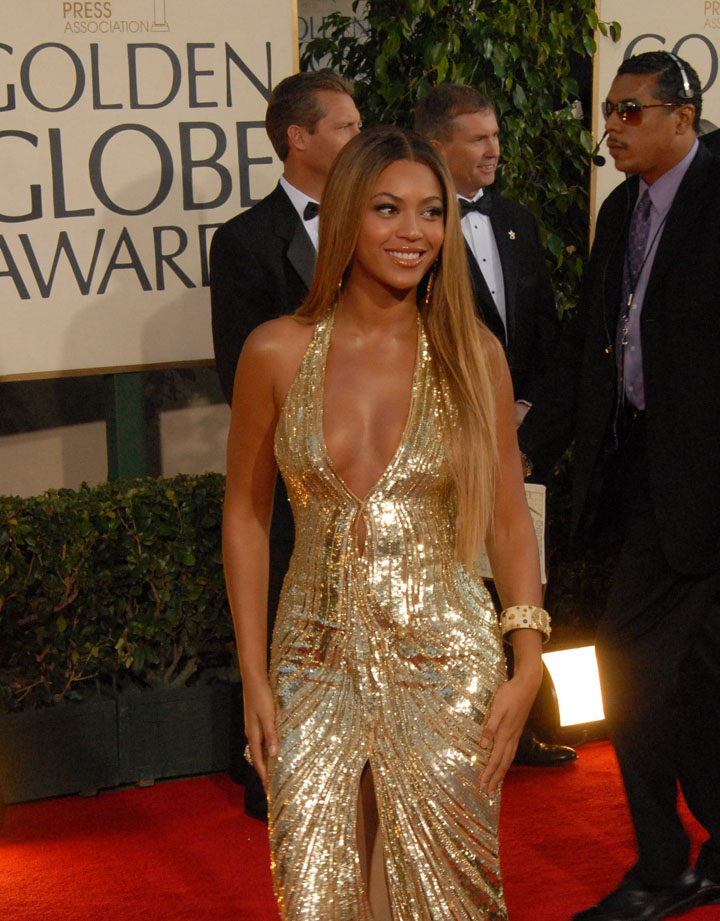 By this point as well foreign markets for Hollywood-based US movies were becoming more important. And the HFPA had “established itself with the studios.” It had begun to play a role in the Southern California entertainment industry, that the industry itself valued. The Golden Globes were certainly not as important as the Oscars – which more or less said what some presumed highest authority in America itself thought about the best of America’s movies. But, as the global markets grew, it was proving useful enough to have some authority representing the interested world outside America say what it thought about America’s movies (and TV). By the 1970s and 1980s the HFPA had somehow managed to become that authority.
By this point as well foreign markets for Hollywood-based US movies were becoming more important. And the HFPA had “established itself with the studios.” It had begun to play a role in the Southern California entertainment industry, that the industry itself valued. The Golden Globes were certainly not as important as the Oscars – which more or less said what some presumed highest authority in America itself thought about the best of America’s movies. But, as the global markets grew, it was proving useful enough to have some authority representing the interested world outside America say what it thought about America’s movies (and TV). By the 1970s and 1980s the HFPA had somehow managed to become that authority.
The annual Golden Globes award show had also managed to establish “its reputation as the most relaxed of the major awards shows,” and “the saltiest, most irreverent of Hollywood’s awards.” Still more to the point, by the 1990s as much as half the gross receipts of some Hollywood-based movies were coming from outside the USA. In 1996 “the HFPA signed a new television broadcast contract with NBC.” And the Golden Globes on TV became what they are today: “a major part of the film industry’s awards season’ which culminates each year with the Oscars.”
The Present …
 Nowadays the “about 90 … members of the Hollywood Foreign Press Association” who decide on the Golden Globes “represent some 55 countries with a combined readership of more than 250 million. Their publications include leading newspapers and magazines in Europe, Asia, Australasia and Latin America, ranging from the Daily Telegraph in England to Le Figaro in France, L’Espresso in Italy and Vogue in Germany as well as the China Times and the pan-Arabic magazine Kul Al Osra.”
Nowadays the “about 90 … members of the Hollywood Foreign Press Association” who decide on the Golden Globes “represent some 55 countries with a combined readership of more than 250 million. Their publications include leading newspapers and magazines in Europe, Asia, Australasia and Latin America, ranging from the Daily Telegraph in England to Le Figaro in France, L’Espresso in Italy and Vogue in Germany as well as the China Times and the pan-Arabic magazine Kul Al Osra.”
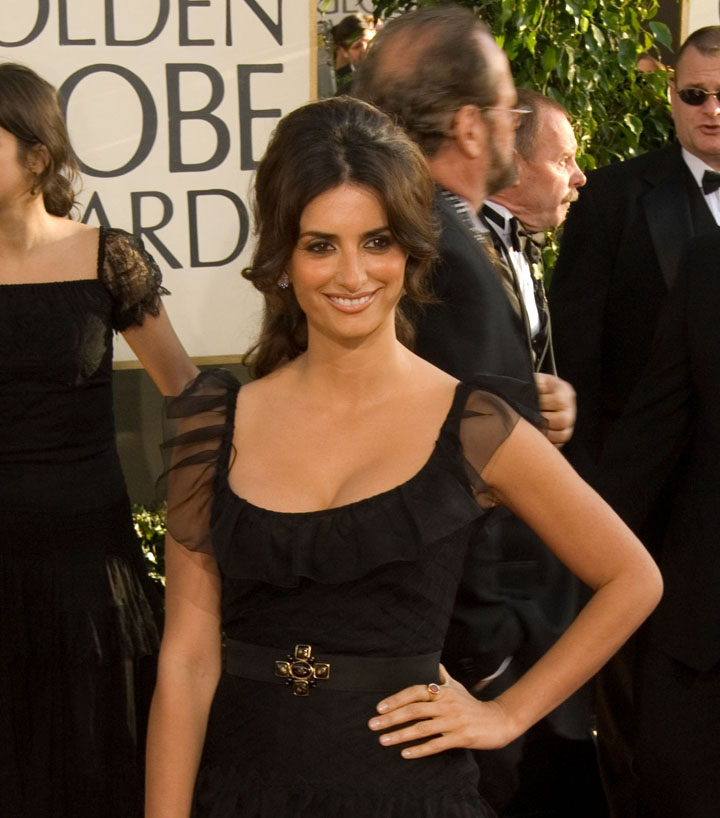 A more detailed hasty examination of the current HFPA membership list reveals that seven of the “active members” today represent publications in the United Kingdom, another seven in Germany, five in Italy, and four each in Canada, France, and Japan. Or, somewhat more than a third of the current active members represent the countries of what used to be the “G7” leading economic powers, outside the United States itself.
A more detailed hasty examination of the current HFPA membership list reveals that seven of the “active members” today represent publications in the United Kingdom, another seven in Germany, five in Italy, and four each in Canada, France, and Japan. Or, somewhat more than a third of the current active members represent the countries of what used to be the “G7” leading economic powers, outside the United States itself.
 Another three members each represent publications in Australia, Egypt, Greece, and Russia – and two members each in Argentina, Austria, Belgium, Hong Kong, Israel, Spain, and Tahiti. (Yes that’s right, Tahiti). More than two dozen additional countries are represented by one member each, including Brazil, Chile, China, India, Mexico, South Africa, South Korea, Switzerland, Thailand, and The Netherlands. (And, just for the record none of these quick calculations take into account the few members who represent publications in more than one country. Jack Tewksbury, e.g., who apparently feeds Hollywood news to all of Argentina, Thailand, and Russia, only gets counted for Argentina.)
Another three members each represent publications in Australia, Egypt, Greece, and Russia – and two members each in Argentina, Austria, Belgium, Hong Kong, Israel, Spain, and Tahiti. (Yes that’s right, Tahiti). More than two dozen additional countries are represented by one member each, including Brazil, Chile, China, India, Mexico, South Africa, South Korea, Switzerland, Thailand, and The Netherlands. (And, just for the record none of these quick calculations take into account the few members who represent publications in more than one country. Jack Tewksbury, e.g., who apparently feeds Hollywood news to all of Argentina, Thailand, and Russia, only gets counted for Argentina.)
Just how a person who resides in the Los Angeles area and does work for the press outside the United States becomes a member of the Hollywood Foreign Press Association nowadays seems an arcane process at best. And this apparently has something to do with recent undercurrents of criticism of the organization inside the USA. There are those who say that HFPA reminds them of the legendary Groucho Marx, who once confessed he wouldn’t want to belong to any club that would have him as a member.
 A year or so ago, an article in the New York Times explained that: “Internally, the press association functions like an exclusive club, admitting a maximum of five new members a year, though more often … accepting only one. Any single member may object to a new member, making it extremely difficult to join. The association does not represent internationally renowned publications like Le Monde or The Times of London – indeed, it has repeatedly rejected applications from a correspondent for Le Monde, while accepting applications from freelance writers from Bangladesh and South Korea.”
A year or so ago, an article in the New York Times explained that: “Internally, the press association functions like an exclusive club, admitting a maximum of five new members a year, though more often … accepting only one. Any single member may object to a new member, making it extremely difficult to join. The association does not represent internationally renowned publications like Le Monde or The Times of London – indeed, it has repeatedly rejected applications from a correspondent for Le Monde, while accepting applications from freelance writers from Bangladesh and South Korea.”
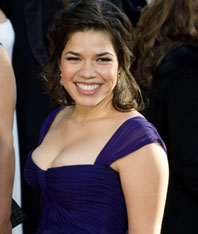 Late in 2005 as well it was reported that: “As Hollywood primps for next month’s Golden Globes ceremony, the small group of foreign journalists behind the awards has been shaken by the suicide of a colleague who was suspended in one of several disciplinary actions to roil the organization in recent years.” In 2003 HFPA member “Frances Schoenberger, was suspended for flinging a glass of wine in another member’s face at a party for Gangs of New York, while the film’s director, Martin Scorsese, stood nearby … ” That same year, HFPA president Phillip Berk “wrote a letter of apology to the actor Brendan Fraser for having grabbed the actor’s buttocks during a ceremony to announce a charitable contribution, though Mr. Berk said in an interview that he did no such thing and wrote the letter only to mollify the actor.”
Late in 2005 as well it was reported that: “As Hollywood primps for next month’s Golden Globes ceremony, the small group of foreign journalists behind the awards has been shaken by the suicide of a colleague who was suspended in one of several disciplinary actions to roil the organization in recent years.” In 2003 HFPA member “Frances Schoenberger, was suspended for flinging a glass of wine in another member’s face at a party for Gangs of New York, while the film’s director, Martin Scorsese, stood nearby … ” That same year, HFPA president Phillip Berk “wrote a letter of apology to the actor Brendan Fraser for having grabbed the actor’s buttocks during a ceremony to announce a charitable contribution, though Mr. Berk said in an interview that he did no such thing and wrote the letter only to mollify the actor.”
 Perhaps partly as a result of the testy US domestic mood promoted by the sponsors of the Iraq War that began in 2003, the television audience for the 2004 Golden Globes (held in January 2005) “dropped 40 percent, to 16.7 million viewers, from the year before.” But perhaps partly because this mood has shifted since the 2006 mid-term elections, this year (in January 2007) “NBC’s telecast of The 64th Annual Golden Globe Awards has delivered NBC’s highest-rated non-Olympic Monday among adults 18-49 in more than two-and-a-half years and most-watched non-Olympic Monday in total viewers in more than seven years.” (And even if we mere mortals cannot possibly understand what that means, it does sound like something good.)
Perhaps partly as a result of the testy US domestic mood promoted by the sponsors of the Iraq War that began in 2003, the television audience for the 2004 Golden Globes (held in January 2005) “dropped 40 percent, to 16.7 million viewers, from the year before.” But perhaps partly because this mood has shifted since the 2006 mid-term elections, this year (in January 2007) “NBC’s telecast of The 64th Annual Golden Globe Awards has delivered NBC’s highest-rated non-Olympic Monday among adults 18-49 in more than two-and-a-half years and most-watched non-Olympic Monday in total viewers in more than seven years.” (And even if we mere mortals cannot possibly understand what that means, it does sound like something good.)
As a critic from the University of Alabama complained this year: “what makes the Globes seem all the more boring is that … the same names … have been thrown around since November. Was anyone really surprised when [Forest] Whitaker and [Helen] Mirren won? No, and you can expect the same results in February at the Academy Awards … it’s getting to the point where there’s no fun left in it.”

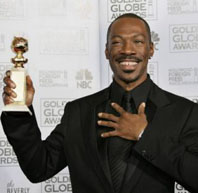 At the same time, my own experience was more positive. I thought the 2007 (2006) Globes had their share of interesting moments - including Warren Beatty’s speech on being given the Cecil B. DeMille Award for “outstanding contributions to the entertainment industry.” It was nice to see Eddie Murphy get an award for Dreamgirls. The attention lavished on the multicultural TV show Ugly Betty seemed somehow forward-looking. Even the current crop of British actors in “American movies” is pretty good. And on and on. (And click here for an official list of all the nominations and resulting awards.)
At the same time, my own experience was more positive. I thought the 2007 (2006) Globes had their share of interesting moments - including Warren Beatty’s speech on being given the Cecil B. DeMille Award for “outstanding contributions to the entertainment industry.” It was nice to see Eddie Murphy get an award for Dreamgirls. The attention lavished on the multicultural TV show Ugly Betty seemed somehow forward-looking. Even the current crop of British actors in “American movies” is pretty good. And on and on. (And click here for an official list of all the nominations and resulting awards.)
Generally the show this year did live up to “its reputation as the most relaxed of the major awards shows,” and “the saltiest, most irreverent of Hollywood’s awards.” It has at least become almost more fun than the Academy Awards themselves. (Allowing that there are altogether too many awards shows on North American TV these days, and that I usually only watch the Academy Awards intermittently, because my wife thinks they are somehow important.)
Meanwhile, some say that the real action was at “Prince’s party at the Beverly Wilshire hotel after the Golden Globes.” There Cameron Diaz and Justin Timberlake, who have apparently just broken up, had “an intense 40-minute talk in a side room away from the party, a conversation that the New York Post labeled as awkward.'” During their conversation Justin Timberlake “slammed his fist (down) into a cabinet,’ but as the couple emerged from their conversation, Diaz re-appeared at the party looking composed.”
Maybe some day these events will be on TV too, and we can all have as much fun as Cameron Diaz and Justin Timberlake. And by then too maybe the Hollywood Foreign Press Association will have evolved into the kind of club that Groucho Marx would want to join. Until then, “Hooray for Hollywood” is still probably the most sensible very last thing to say. In the rising new global village the Globes are important too, even inside the USA. Only Bush and Cheney (and Scooter Libby?) still think the Academy Awards are all that counts today.


i love all Eddie Murphy movies. i like also the movie DAVE where he co stars with Elizabeth Banks.**”